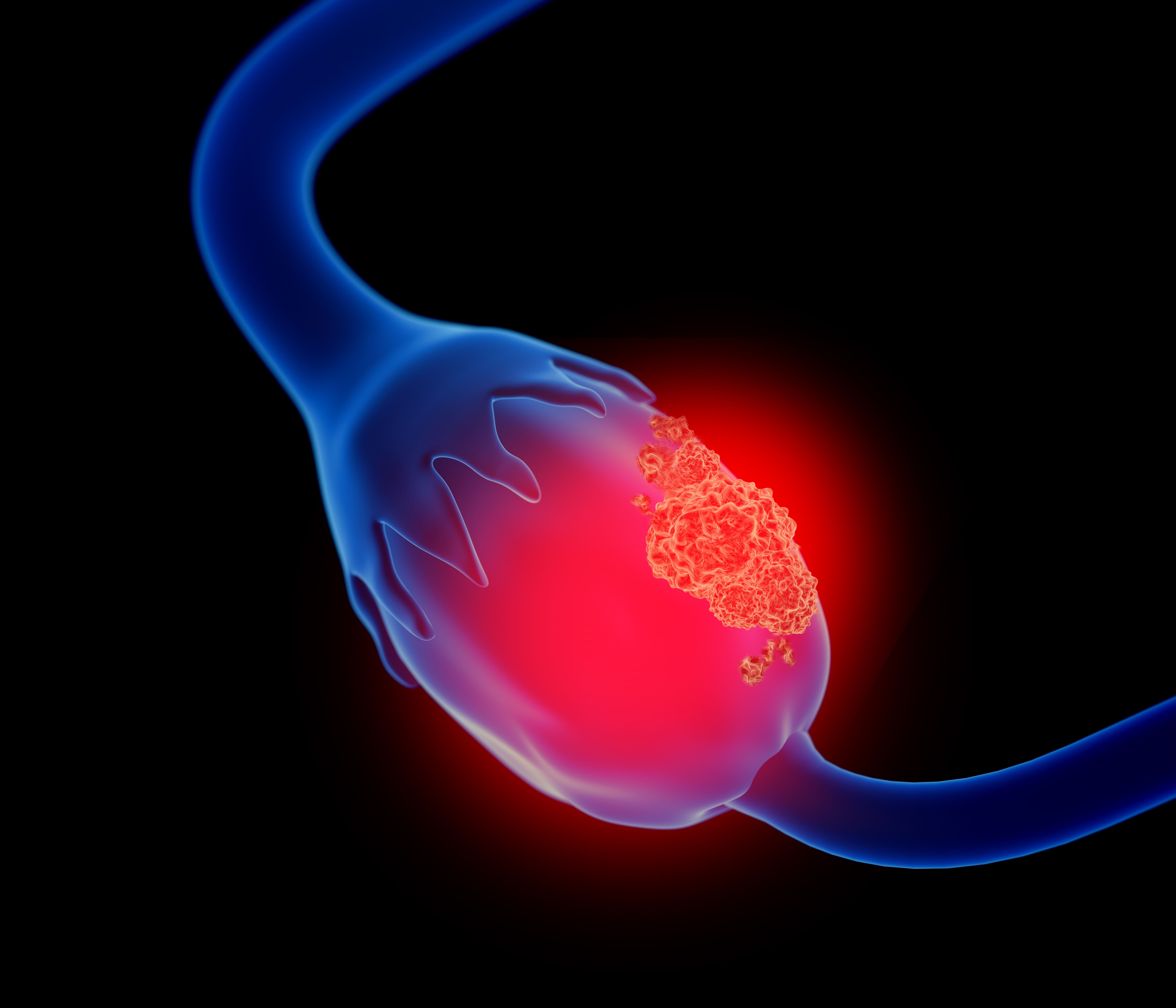Investigators Initiate Phase II/III REJOICE-Ovarian01 Trial of Raludotatug Deruxtecan for Platinum-Resistant Ovarian Cancer
Raludotatug deruxtecan is a potential first-in-class CDH6-directed antibody drug conjugate that has shown promise in patients with CDH6-expressing serous-type ovarian cancer and renal cell carcinoma.
Image credit: Lars Neumann | stock.adobe.com

Researchers have dosed the first patient in the Phase II/III REJOICE-Ovarian01 trial (NCT06161025) to analyze the efficacy and safety of raludotatug deruxtecan (Daiichi Sankyo and Merck) in patients with platinum-resistant ovarian cancer.1,2 The investigational therapy is a potential first-in-class CDH6-directed antibody drug conjugate comprised of a humanized anti-CDH6 IgG1 monoclonal antibody that attaches to several topoisomerase I inhibitor payloads through tetrapeptide-based cleavable linkers.1
“Raludotatug deruxtecan has shown promising activity in a Phase I trial of patients with advanced ovarian cancer,” Mark Rutstein, MD, global head, oncology clinical development, Daiichi Sankyo, said in a press release. “The REJOICE-Ovarian01 trial, which is our first trial initiation for raludotatug deruxtecan in collaboration with Merck, will evaluate the efficacy of this CDH6 directed DXd antibody-drug conjugate versus investigator’s choice of chemotherapy in patients with platinum-resistant ovarian cancer.”1
Approximately 70% to 80% of patients with advanced ovarian cancer administered standard therapy with platinum-based chemotherapy regimens still experience disease progression. Median overall survival (OS) for patients with advanced ovarian cancer following disease recurrence is approximately two years. The five-year survival rate for these patients is less than 30% and up to 85% of advanced ovarian tumors show overexpression of CDH6. Further, treatment options are limited for patients who develop resistance to platinum-based chemotherapy.1
The initiation of the Phase II/III trial was based on results from an ongoing Phase I trial (NCT04707248) of raludotatug deruxtecan, which was presented at the European Society for Medical Oncology Congress 2023. A subgroup analysis was presented at the Society for Gynecologic Oncology 2024 Annual Meeting on Women’s Cancer.
“[Raludotatug deruxtecan] demonstrated potent antitumor activity against CDH6-expressing tumors in mice and an acceptable safety profile in monkeys,” wrote the authors of a study published by Molecular Cancer Therapeutics. “These findings indicate the potential of [raludotatug deruxtecan] as a new treatment option for patients with CDH6-expressing serous-type ovarian cancer and renal cell carcinoma in a clinical setting.”3
The global, multicenter, randomized, open-label REJOICE-Ovarian01 trial will enroll patients with platinum-resistant, high-grade ovarian cancer—including primary peritoneal or fallopian tube cancer—who were previously administered at least one and no more than three systemic lines of anticancer therapy, including mirvetuximab soravtansine in patients with documented high-folate receptor alpha expression.1,2
In the Phase II portion of the trial, investigators will evaluate the safety and tolerability of raludotatug deruxtecan at doses of 4.8 mg/kg, 5.6 mg/kg, and 6.4 mg/kg to determine the recommended dose for Phase III. The primary endpoint for Phase II is objective response rate (ORR) as assessed by blinded independent central review (BICR), with secondary endpoints that include ORR as assessed by investigator, duration of response (DoR), progression-free survival (PFS) and disease control rate (DCR)—all of which will be analyzed by both BICR and an investigator—and OS.
In Phase III of REJOICE-Ovarian01, investigators will evaluate the efficacy and safety of the selected dose of the novel therapy vs. investigator’s choice of chemotherapy with paclitaxel, pegylated liposomal doxorubicin, gemcitabine, or topotecan. This phase’s dual primary endpoints are ORR and PFS as assessed by BICR, with secondary endpoints that include PFS and ORR assessed by investigator, DoR and DCR assessed by both BICR and investigator, and OS.
“The prognosis for the majority of patients diagnosed with advanced ovarian cancer is bleak, with a low five-year survival rate, underscoring the critical need for the development of innovative and effective therapies,” Marjorie Green, MD, senior vice president and head of late-stage oncology, global clinical development, Merck Research Laboratories, said in a press release. “We look forward to working with our colleagues at Daiichi Sankyo to further evaluate the potential of raludotatug deruxtecan to provide a new treatment option for patients with platinum-resistant ovarian cancer.”1
References
1. REJOICE-Ovarian01 Phase 2/3 Trial of Raludotatug Deruxtecan Initiated in Patients With Platinum-Resistant Ovarian Cancer. Merck. News release. April 3, 2024. Accessed April 3, 2024. https://www.merck.com/news/rejoice-ovarian01-phase-2-3-trial-of-raludotatug-deruxtecan-initiated-in-patients-with-platinum-resistant-ovarian-cancer/
2. A Study of Raludotatug Deruxtecan (R-DXd) in Subjects With Platinum-resistant, High Grade Ovarian, Primary Peritoneal, or Fallopian Tube Cancer. ClinicalTrials.gov identifier: NCT06161025. Updated March 26, 2024. Accessed April 3, 2024. https://clinicaltrials.gov/study/NCT06161025
3. Hirokazu Suzuki, Shotaro Nagase, Chiemi Saito, Atsuko Takatsuka, Motoko Nagata, Kokichi Honda, Yuki Kaneda, Yumi Nishiya, Tomoyo Honda, Tomomichi Ishizaka, Kensuke Nakamura, Takashi Nakada, Yuki Abe, Toshinori Agatsuma; Raludotatug Deruxtecan, a CDH6-Targeting Antibody–Drug Conjugate with a DNA Topoisomerase I Inhibitor DXd, Is Efficacious in Human Ovarian and Kidney Cancer Models. Mol Cancer Ther 1 March 2024; 23 (3): 257–271. https://doi.org/10.1158/1535-7163.MCT-23-0287
Unifying Industry to Better Understand GCP Guidance
May 7th 2025In this episode of the Applied Clinical Trials Podcast, David Nickerson, head of clinical quality management at EMD Serono; and Arlene Lee, director of product management, data quality & risk management solutions at Medidata, discuss the newest ICH E6(R3) GCP guidelines as well as how TransCelerate and ACRO have partnered to help stakeholders better acclimate to these guidelines.
FDA Expands Farapulse PFA Approval to Persistent AF After Strong ADVANTAGE AF Trial Results
July 7th 2025Boston Scientific’s Farapulse Pulsed Field Ablation System is now approved for treating persistent atrial fibrillation, following 12-month data from the ADVANTAGE AF trial showing strong safety, high freedom from AF, and no major complications.